Previously we looked at some of the BBC’s coverage of the January 27th terror attack in the Neve Ya’akov neighbourhood of Jerusalem:
BBC REPORTING ON NEVE YA’AKOV TERROR ATTACK
One of those reports – originally published on the BBC News website around an hour after the attack took place – was amended the following day to include news of another shooting attack that took place in the City of David area of Jerusalem on the morning of January 28th. The first of those amendments read:
“Police said two people were injured on Saturday in a separate “terrorist attack” outside the Old City.”
The next version, published half an hour later, read:
“Police said two people were injured on Saturday in a separate “terrorist attack” outside the Old City.
Police said the gunman in this second attack was a 13-year-old boy. They said he had been “neutralised”, but did not give further details.”
Half an hour or so after that the article was amended again and the version currently available on the BBC News website does not include that superfluous qualifying punctuation around the words terrorist attack:
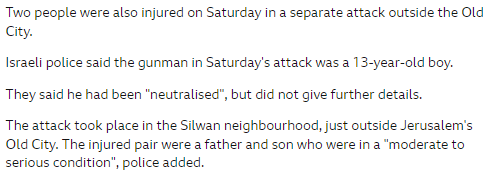
Later in the day on January 28th the BBC News website published an additional report which was originally headlined “Jerusalem shooting: Thirteen-year-old held over second attack in days” and which told readers that: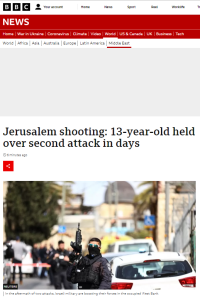
“A 13-year-old Palestinian boy was behind a shooting in Jerusalem on Saturday, Israeli police have said.
Two people – a father and son – were seriously wounded, while the attacker was shot and injured by passers by and is being held in hospital. […]
Describing Saturday’s incident, which took place in the Silwan neighbourhood just outside Jerusalem’s Old City, a spokesperson for the Israeli police said the assailant ambushed five people as they made their way to prayers, leaving two in a “critical condition”.
“This is a significant rise in the level of terror,” said Dean Elsdunne, adding that the “terrorist” is being treated in hospital.”
That qualifying punctuation around the word terrorist also appeared in five subsequent versions of the report, which at the time of writing is headlined ‘Jerusalem shooting: Israel proposes looser gun laws after attacks’ and now describes the City of David attack as follows:
“The announcement came after Israeli police said a 13-year-old Palestinian boy was behind a shooting in Jerusalem’s Silwan neighbourhood on Saturday that left an Israeli father and son seriously wounded.
An Israeli police force spokesperson previously said the assailant ambushed five people as they made their way to prayers, leaving two in a “critical condition”. The 13-year-old was shot and injured by passers-by and is being held in hospital.”
According to local media reports the return of fire came from the group of people that had been attacked – including one of the wounded – rather than “passers-by”:
“The Israel Defense Forces later said the son was an off-duty officer in the Paratroopers Brigade and that the soldier had managed to shoot and hit the attacker despite his wounds. […]
Police said the 13-year-old terrorist arrived in the area armed and apparently carried out the attack alone.
In surveillance video from the scene he can be seen waiting behind some parked cars before opening fire toward a group of people.
He was shot by two armed members of the group, including the off-duty officer.”
All versions of those two written reports promote false equivalence between the two terror attacks in Jerusalem and the earlier counter-terrorism operation against a Palestinian Islamic Jihad cell in Jenin in which eight armed terrorists and one uninvolved civilian were killed, as did a long report aired on the BBC News TV channel on January 28th which was introduced by the presenter – apparently Annita McVeigh – as follows:
Presenter: “Israeli police say that two people have been wounded in a terrorist attack just outside the Old City in occupied East Jerusalem. It comes a day after a Palestinian gunman killed seven people near a synagogue. Israeli police say they have arrested 42 people in connection with Friday’s shooting. The gunman was killed. Israel’s prime minister Benjamin Netanyahu has urged Israelis not to take matters into their own hands. On Thursday nine Palestinians were killed during an Israeli military raid in the West Bank town of Jenin.”
Viewers next saw the same report from Tom Bateman that had been aired on BBC One the night before which also includes the topic of the counter-terrorism operation in Jenin against a cell planning an attack. That was followed by an interview with the BBC Jerusalem bureau’s Yolande Knell who began by talking about the terror attack earlier in the day. [emphasis in italics in the original, emphasis in bold added]
Knell: “This was in Silwan which is very close to the walled Old City in Jerusalem. It’s a flashpoint neighbourhood because of the presence of Jewish settlers there alongside Palestinian residents. What we’re hearing quite shockingly is that a Palestinian boy of thirteen was the gunman in this case; that’s coming from the police.”
Later in the conversation the presenter introduced the BBC old favourite theme of ‘cycle of violence’:
Presenter: “Yolande, we see this happening in cycles it seems in the region; periods where there are clashes, yes, but then punctuated by bloodshed, by lots of deaths. What’s behind this latest cycle?”
As noted here on numerous occasions throughout the past six months or so, BBC audiences have not seen any reporting on factors that have contributed to the rise in Palestinian terrorism (and therefore an increase in Israeli counter-terrorism operations) such as the Palestinian Authority’s loss of control of parts of Area A where it is responsible for security, the provision of funding and weapons for terrorism by Hamas and foreign actors, the rise in the number of members of the PA security forces engaging in terrorism and the political infighting both within the PA and between it and other Palestinian factions.
Yolande Knell’s response did not deviate from that mould. Her explanation of “this cycle” mentioned the terror attacks against Israelis last Spring before going on:
Knell: “Then Israel’s military launched what it said was a counter-terrorism offensive in the West Bank. Near nightly raids in Palestinian towns and cities, a lot of them concentrated actually in Jenin, the refugee camp there.”
Knell’s portrayal also included “people giving up hope” because “it’s been 14 [sic] years since peace negotiations stalled” and “Palestinians don’t see any hope of a political solution for this at the moment”. She of course neglected to mention that the Palestinian Islamic Jihad and Hamas terrorist organisations are not remotely interested in a “political solution” or “peace negotiations” or that it was the Palestinians who brought the last round of negotiations to an end in 2014 when they announced ‘reconciliation’ between Fatah and Hamas.
Knell also cited the new Israeli government which has been in office for barely a month as including far-Right ministers with “ideas that would end all hopes of a two-state solution” – yet again failing to clarify that the deeply divided Palestinian leadership has for decades included people who are no less “far-Right” and are entirely uninterested in what she described as “the international formula for peace”.
As ever, the BBC’s ‘analysis’ of security issues strips Palestinians of all agency and responsibility, while promoting false equivalence and redundant linkage between Israeli military operations aimed at preventing attacks by armed members of terrorist organisations and the indiscriminate murders of Israeli civilians.
The report closed with an interview with an Israeli journalist which the BBC presenter introduced saying:
Presenter: “So Yolande just reporting that police are saying the gunman – and I use the word gunman advisedly – in this latest incident is in fact a 13-year-old boy.”

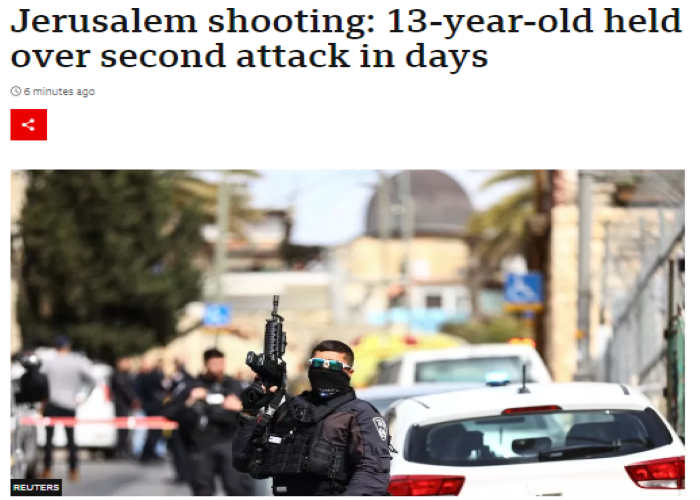


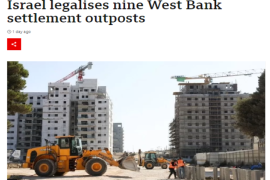
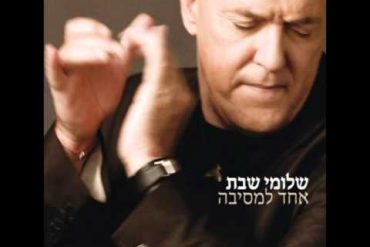
These BBC journalists were honed by the current International News Editor, formerly Mid East Editor, Jeremy Bowen, probably together with the BBC ace reporter Lis Doucet – perhaps the originators of the fake news style with respect to Israel